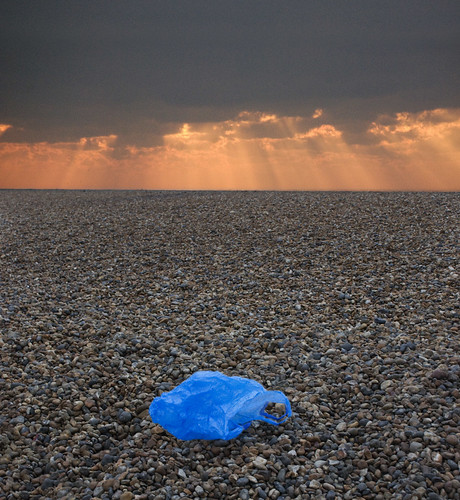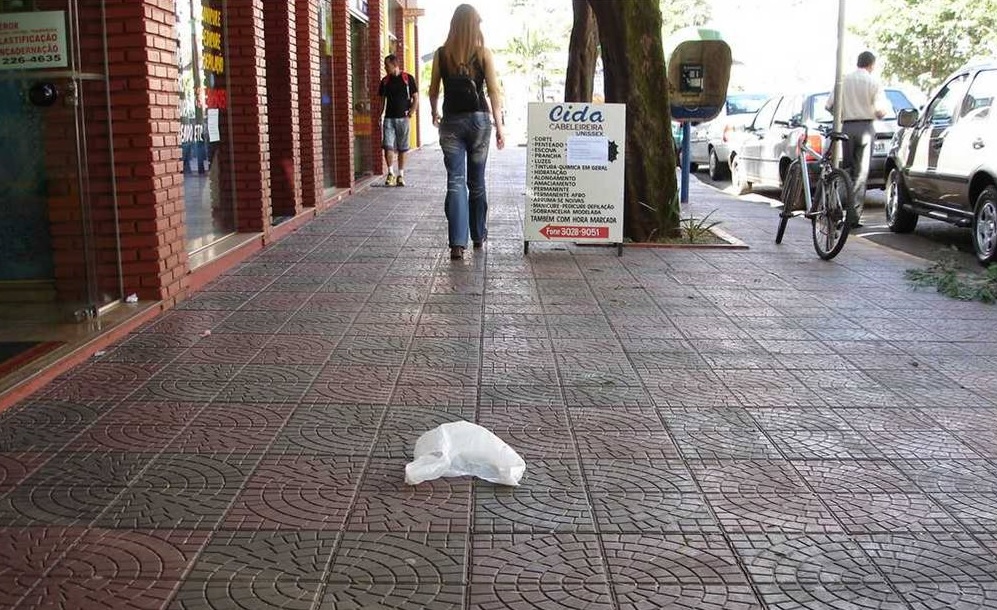Entrevista concedida pela FUNVERDE para a revista HM! sobre as malditas sacolas plásticas de uso…
Argentina – War on Plastic

The ArgenTimes, 01 de março de 2009
Shiny and light, scrunchable yet durable, cheap to produce and even waterproof, it is no wonder that plastic bags are the most popular way to transport groceries in every corner of the world.
However, when the first plastic bags were born, we never imagined that 40 years on we would be facing a crisis of plastic bag over-population. With a life expectancy of beyond 300 years, the first generation of plastic bags has outlived many of the first proud users of this revolutionary shopping accessory.
Despite the example set by both national and city governments around the world to ban or heavily tax plastic bags, it seems that neither the Buenos Aires government nor the national government have taken action to control the plastic plague in Argentina.
Whether plastic bags are destroyed in incinerators, hidden in landfill, or left to journey into the unknown – usually ending up in the ocean – they have devastating effects on the environment.
According to research published by the UN Environment Programme in 2006, every square kilometre of sea holds nearly 18,000 pieces of floating plastic. This plastic, apart from releasing toxins poisonous to marine life as it slowly decomposes, is often mistaken for food by turtles, whales and albatrosses, to name a few species.
If little Tommy turtle’s stomach gets filled up with indigestible plastic, he suddenly finds that he floats and can no longer dive for food, so dies of starvation.
Not only does marine life suffer from ingesting plastic, but it is estimated that 100,000 marine mammals are literally tangled to death every year by plastic bags.
The world is riddled with immortal plastic bags – in the first month of 2009 over 41 billion plastic bags came into existence – and Buenos Aires keeps on lapping them up.
It is hard to pass a day in this city without amassing a few more plastic bags. Just buying one apple you can easily end up with two bags, one from the fruit counter and one from the cashier. Only 3.5% of these bags are recycled and most are used for an average 15 minutes before being disposed.
Pioneering Warriors
Although small scale and not endorsed by any government authorities, Buenos Aires is home to some active movements striving to reduce the plastic bag presence in the city.
‘No uso bolsas plasticas’ (I don’t use plastic bags) is a local initiative set up by environment conscious
Luciana De Luca.
Joaquin Wall, who works on the project alongside De Luca, explains why they are fighting to eliminate plastic bags altogether.
“ It is incredible the amount of plastic that is consumed in Buenos Aires and until recently there seemed to be no public awareness about the sheer quantity of plastic bags we use or the environmental impacts.”
Wall believes the lack of concern stems from retailers. “No one asks you in the shops if you need a bag they just give you one automatically. If you say that you don’t need it they give you a strange look and usually try and give it to you anyway.
“We really just want to create awareness and try to change habits,” he says. No uso bolsas plasticas has created a website and facebook page to spread the word.
They also fabricate 100% cotton plastic-bag-replacement bags branding the message ‘no uso bolsas plasticas’ which they sell at production price, $10.
Natural Deli, an organic food market and restaurant, has taken its campaign against plastic bags a step further.
Not only have they brought out a range of canvas shopping bags with fun designs stating ‘soy verde’ (I’m green) or ‘no soy descartable’ (I’m not disposable), but they have also begun using oxo-biodegradable plastic bags.
“It looks and feels like plastic but in six months it will turn into thin air,” says the owner of Natural Deli, Michael Legge.
As this is a relatively new technology, especially in Argentina, it has taken Legge some dedication to find a supplier for the oxo-biodegradable bags.
“Although the oxo-biodegradable bags only cost 10% more than normal bags, it is hard for small businesses in Argentina to find suppliers as the bags can only be ordered in large quantities.
“If a supermarket chain or large retailer were to opt for the oxo-biodegradable plastic bags, getting supplies to smaller businesses would be easier too,” he adds.
Love not War
“Plastic is fantastic” it boldly states on the Symphony website, the British company that developed bio-degradable plastic.
Representative of the Argentine branch of Symphony, Alejandro Dewald, explains how oxo-biodegradable plastic works. “During the fabrication process of plastic bags, we use an additive called d2w which gives the plastic biodegradable properties. The only residues after biodegradation are carbon dioxide, water and biomass.”
Symphony began operation in Argentina three years ago and Dewalt assures me that it is growing rapidly.
“We are working with the local government to change legislation regarding plastic,” says Dewalt. “The law introduced last year allowing shops one year to ban plastic bags in Buenos Aires province will be effective from 14th October 2009.”
Five billion plastic products, mostly bags, have been produced globally using the d2w technique. In Latin America, Brazil is the biggest user of d2w plastic.
Maybe this plastic cloud does have a silver lining: a plastic bag with a limited life. “The beauty of the product,” says Michael Stephens, deputy chairman of Symphony UK, “is that even if it is not recycled or reused, even it misses getting picked up by refuse collection, it may fly off into the wild, get caught up in a tree, and through exposure to air and sunlight it will simply disappear.”
War or Peace
So, where does the solution lie? Do we doggedly try to eliminate the plastic bag from our lives, opting for canvas bags and wicker baskets, or do we resign ourselves to the omnipresence of this plastic commodity in our world, but at least exercise some control over its life span?
Unfortunately, in Argentina today both options still represent ideals rather than realities.
Various governments at provincial level have taken a stand against plastic bags. In the province of Buenos Aires a law was passed last October allowing supermarkets and large shops one year and smaller shops two years to remove plastic bags from their businesses.
After several attempts to communicate with the Ministry of Environment and Public Space for the government of Buenos Aires, no one was able to advise me of any action the city government is taking to reduce plastic bags.
Inquiries made to the Secretariat of Environment and Sustainable Development for the national government were equally fruitless; leading me to believe that there is no initiative or plan-in-progress to combat the excessive use of plastic bags in Argentina.
It seems that valiant efforts by provincial governments to align plastic bag legislation with more environmentally friendly practices are undermined by a lack of support from the national government.
More than 50 countries worldwide, including Bangladesh, Tanzania and the Philippines, have introduced legislation to cut down on plastic bags, over half enforcing a complete ban on plastic bags.
While the Bangladeshis no longer clog up their drainage system or cram landfills with plastic bags, in the Argentine capital plastic bags remain in plentiful supply, usually under-used and rarely recycled, and all of which will be around a lot longer than us mortals.




Este Post tem 0 Comentários